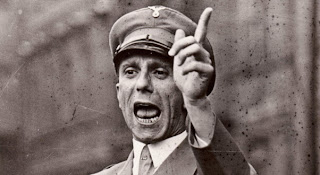When I was a boy old books spurred my fascination
with World War II . My grandfathers
had both fought—one in North Africa and Italy and the other in Germany. When I would pour over my Grandpa Mel’s
books, which my Grandma LaVerne kept beside his medals and rucksack in her
apartment, “Vernie” as I’d call her, would sometimes characterize some of the
war’s major characters. Vernie had a way
of quickly summing up a person: “He was
a general” or “He was a real jerk.”
When I pointed to a slicked, beady-eyed
man screaming behind a microphone she said, “That’s Goebbels. He was evil.”
As the “Minister of Public
Enlightenment and Propaganda” Joseph Goebbles directed the sinister pageantry of the Third
Reich and after the Weirmacht's calamitous defeat at Stalingrad, Hitler slithered into
isolation and confidence in him ebbed and Goebbels became the reptilian face of
the German war effort. What Vernie
likely remembered was the news reels of the Fuhrerbunker in bombed out
Berlin. (It is interesting that what
lives after him is a propaganda film!) In
these notorious images, the camera sweeps over the dead bodies of Goebbels's six
murdered children lying beside the charred corpses of their father and mother. The Reichminister had decided he would die
beside Hitler thus condemning his whole family as well as his name.
In “The Goebbels Experiment” Lutz
Hachmeister has skillfully pieced
together film reels from Weimar to bunker Berlin to tell the story of Goebbels very
public life. Kenneth Branagh provides a
narration of excerpts from Goebbels diaries.
The person that emerges from the
excerpted diaries is not some angel of evil but a highly literate (he received
his PhD in literature) and vain careerist whose petty quarrels and political
jockeying belie a gnawing and ever-present insecurity, especially about being
an intellectual in a party that denounced reason.
He had much to be insecure about.
To one reporter, “He had a gaunt, rather small body, a
disproportionately large head, and an incredible mouth…a mouth that cut his
face in two. I noticed particularly
that, even then, he moved a bit like a puppet.” Francis Bacon once modeled the mouth of his screaming Pope on Goebbels in full harangue.
He was a failed writer a poor journalist; he was awkward, club-footed, homely, and effeminate. In his early years as a Nazi activist, there
were even rumors he was homosexual. When
working for the Angriff (The Assault)
he mastered the art of lying, manipulation, and poured his failed literary
ambitions and insecurities into his personal diaries.
When discussing his relationship with
Magda it was not enough to love her, he needed to “possess” her. She must “belong” to him. And what was the point of having six children
if not showing of your virility and extreme commitment to the cause of National
Socialism.
Hachmeister's reels excel
in that they remove the fanatical fire of a Goebbels speech by supplying his cynical
and dryly precise analysis of them. Goebbels
is interested not so much in the content, but the coherence of speech, the
facial expressions of the orator, and the care and precision of each gesture. They
were merely theatrical work. Nothing more. He may have believed whole-heartedly in the
principles of the Reich, who’s to say?
But what the director highlights are the unprincipled ambitions in Goebbels
core and an insatiable desire to be accepted.
Need Germans to commit to some vague notion of “total war”? No problem,
a speech will do! Destroyed cities and
ruined buildings are deflating morale?
All the more reason for a new propaganda film and radio address! There is a twisted elation in the destruction
of war as a means of receiving the washing acclaim of the crowd, the heartfelt
appreciation of the destitute.
But I think the great Austrian
radical Ernst Fischer captured the sickening feeling in the experience of Nazi theatricality--the evil of their propaganda in his
memoir, An Opposing Man. Though he was writing about Hitler, he could just
as easily have been writing about Goebbels:
I loathed everything about him, his voice, his face, his
figure, his form of expression, his gestures, the very least of his
pronouncements. Although he did not
drink, he was the beery smog of all beer cellars made flesh, a doper drinking
himself crowd-silly, after every mass-meeting drained, drooping and pallid,
seemingly wading through slime. And
beforehand, the baying, the bellowing, the screaming of the little man in the
throes of hysteria, gone off the rails, the déclassé petit-bourgeois turned
gangster, an amalgam of pity for himself and vindictiveness towards all those
who have made something of their lives—the skilled worker, the noted writer,
architect or painter, the senior executive officer—a pariah dog taking his cue
from a werewolf, a man gone down in the world, self-commiserating and ruthless,
perfidious and attitudinizing, struggling to reach the top by fair means or
foul, a sob in his throat, teeth bared, a sham Nero dreaming of ovations, of
artistic renown, of holocausts, the rabble-rousing genius of complete
dehumanization.


No comments:
Post a Comment